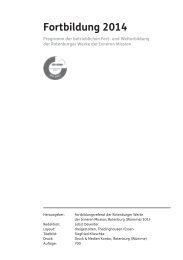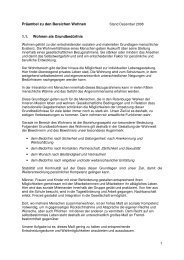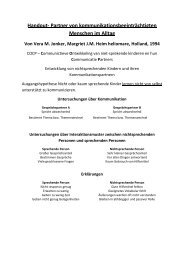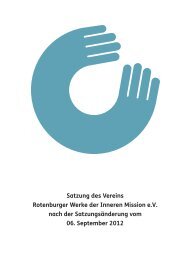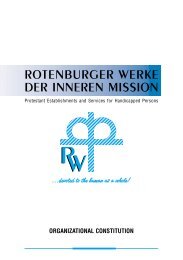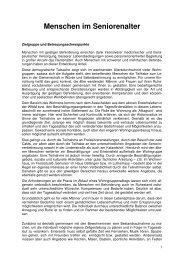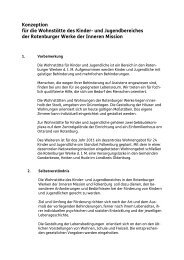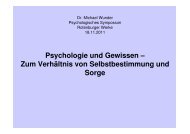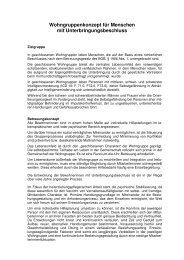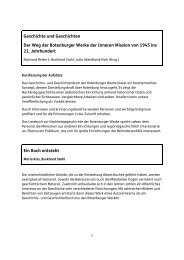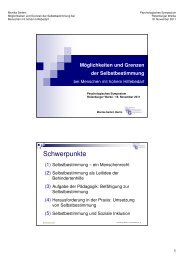ROTENBURGER WERKE DER INNEREN MISSION
ROTENBURGER WERKE DER INNEREN MISSION
ROTENBURGER WERKE DER INNEREN MISSION
Create successful ePaper yourself
Turn your PDF publications into a flip-book with our unique Google optimized e-Paper software.
<strong>ROTENBURGER</strong> <strong>WERKE</strong><br />
<strong>DER</strong> <strong>INNEREN</strong> <strong>MISSION</strong><br />
Protestant Establishments and Services for Handicapped Persons<br />
...devoted to the human as a whole!<br />
ORGANIZATIONAL CONSTITUTION
Bernd Röhrs, 1992<br />
„Ein Mensch“ – Öl auf Karton
<strong>ROTENBURGER</strong> <strong>WERKE</strong> <strong>DER</strong> <strong>INNEREN</strong> <strong>MISSION</strong><br />
Protestant Establishments and Services for Handicapped Persons<br />
...devoted to the human as a whole!<br />
The Rotenburger Werke der Inneren Mission e.V. support different establishments<br />
and services for persons with mental, physical and emotional<br />
handicaps. They work with the goal of assisting handicapped persons in<br />
leading a selfdetermined and independent life integrated, as far as is possible<br />
for each individual, into the general society.<br />
ORGANIZATIONAL PHILOSOPHY<br />
The Rotenburger Werke der Inneren Mission e.V. interpret their work as<br />
the attempt to enable persons to experience that God gives all man equal<br />
dignity and equal rights in life. They are a place in which the brotherly<br />
love that Jesus Christ lived and testified to shall be accomplished in a<br />
concrete form demonstrated by respect for the individual dignity. For the<br />
future they also place themselves in the tradition of the Innere Mission<br />
which as a spiritual movement has had a major influence on the social<br />
culture in our country and in which the pledge for justice and the testimony<br />
of the love of God belong together.<br />
The Rotenburger Werke der Inneren Mission e.V. stand for professionally<br />
qualified aid that is adjusted to the particular needs of each person.<br />
They commit themselves to providing the content, extent and the quality<br />
of services that have been agreed upon.<br />
The Rotenburger Werke der Inneren Mission e.V. see themselves as a<br />
„Diakonisches Unternehmen“ (a Protestant social welfare enterprise).<br />
Standards that fundamentally apply to business organizations must be set<br />
for all their establishments and services. Inherent to these standards are<br />
integral thinking, goal orientated and economic conduct, quality consciousness,<br />
a clear distribution of competences and responsibilities as well<br />
as transparency and efficiency of procedures.<br />
1
PREFACE<br />
The organizational constitution presented including the guide lines of the<br />
Rotenburger Werke der Inneren Mission as well as the complete renovation<br />
of the organizational structure with new institutional statutes are the<br />
results of an approximate five-year-process of goal planning. Even<br />
though this process has, for the moment, come to an end, the orientation<br />
towards the future will remain a permanent responsibility.<br />
We are conscious of the fact that in an “organizational constitution” not<br />
all tensions nor discontinuities can be made clear which handicapped persons<br />
in particular experience in their lives; tensions and discontinuities<br />
which we, too, feel in our work and for which we carry part of the responsibility.<br />
We thank all those who in any way have been involved in the process of<br />
goal planning of the Rotenburger Werke der Inneren Mission.<br />
27356 Rotenburg (Wümme), May 28th, 1997<br />
The Committee of Trustees<br />
The Directing Commitee<br />
during the process of goal planning<br />
The present text is the translation of the revised second edition of the<br />
organizational constitution.<br />
Rotenburg (Wümme), August 10th, 2000<br />
The Committee of Trustees and Board of Directors<br />
of the Rotenburger Werke der Inneren Mission<br />
2
CONTENTS<br />
I. General Principles<br />
1. Who We Are – The Rotenburger Werke der Inneren Mission e.V.<br />
2. What Defines Us<br />
3. Our Goals<br />
4. Our Principles of Conduct<br />
II. Living Spheres<br />
1. The Framework<br />
2. Special Situations and Special Needs<br />
3. Living<br />
4. Education<br />
5. Occupational Activities/Work<br />
6. Leisure Time<br />
7. Health<br />
8. Parish Life<br />
9. Central Services<br />
III. A protestant Social Welfare Enterprise<br />
– „Diakonisches Unternehmen“ –<br />
1. Fundamentals<br />
2. Our Organization<br />
3. Entrepreneurial Conduct<br />
4. Employees<br />
4.1 Fundamentals<br />
4.2 Organization of the Work Process<br />
4.3 Education<br />
4.4 Further Education<br />
4.5 Employee Participation<br />
5. Partaking in the Communal and Regional Life<br />
6. Public Relations<br />
3
I. GENERAL PRINCIPLES<br />
1. Who We Are - The Rotenburger Werke der Inneren Mission e.V.<br />
The Rotenburger Werke der Inneren Mission support different establishments<br />
and services for persons with mental, physical or emotional handicaps.<br />
They are a registered, non-profit-making society, member of the<br />
Diakonisches Werk (Protestant social welfare work organization) of the<br />
Lutheran Church of Hannover as well as member of the Bundesverband<br />
Evangelische Behindertenhilfe (BEB) (Association of Prostestant institutions<br />
for the aid of handicapped persons).<br />
2. What Defines Us<br />
„The dignity of man is inviolable. It is the responsibility of all state power<br />
to respect and defend it.“ (Art. 1 of the German Federal Constitution).<br />
With their work the Rotenburger Werke der Inneren Mission want to<br />
make a contribution to ensure that the declaration in<br />
Art. 1 of the German Federal Constitution is a reliable framework for<br />
handicapped persons in the organization of their lives. The dignity of man<br />
includes his entire existence with its various needs. Our work is devoted<br />
to the human as a whole. Included in these needs are:<br />
• Eating and drinking<br />
• Care and clothing<br />
• Housing<br />
• Education<br />
• Communication<br />
• Social relations and belonging<br />
• Love and sexuality<br />
• Security and appreciation<br />
• Confidence and faith<br />
• Freedom and self-determination<br />
• Responsibility<br />
The Rotenburger Werke der Inneren Mission interpret their work as<br />
the attempt to enable persons to experience that God gives all man<br />
equal dignity and equal rights in life. They are a place in which the brotherly<br />
love that Jesus Christ lived and testified to shall be expressed<br />
concretely in the form of respect of the individual dignity. The commandment<br />
of brotherly love is founded on the experience of the love of<br />
God. This experience is beyond our disposal. In this respect, the success<br />
of Protestant social welfare work and of all our life endeavours is<br />
regarded as a gift and our conduct founded on hope.<br />
4
3. Our Goals<br />
The name of our establishments and services contains the term „Innere<br />
Mission“. In this we express part of our origins. Not all original intentions<br />
of the Innere Mission are applicable in the present time. What has remained<br />
is the intention derived from the Gospel of Jesus Christ to create a<br />
social culture in which the pledge for justice and the testimony of the love<br />
of God are combined.<br />
Within this goal setting we try to create conditions that enable handicapped<br />
persons<br />
• to lead a life in a community<br />
• to claim their rights<br />
• to secure their needs even in adverse conditions.<br />
We want that handicapped persons are able to lead a life in the general<br />
society which is self-determined in accordance with the capacity of each<br />
individual and which is as independent as possible.<br />
4. Our Principles of Conduct<br />
We commit ourselves to a culture of helping, by which we respect the<br />
person in need of help. Initially we assist the persons to understand their<br />
possibilities and limitations for an autonomous life organization. Then<br />
we discuss the individual needs of the persons affected with the persons<br />
themselves and their relatives or the people in charge of their life planning;<br />
we secure the necessary measures and translate them into action.<br />
The claiming of arranged help is, in our eyes, an expression of a selfdetermined<br />
and independent life.<br />
The form of help we render we call “assistance”. It demands human<br />
maturity and professionally competent conduct. The assisting person<br />
must be able to withdraw in situations where it is necessary. It is therefore<br />
part of our responsibility to create the right conditions for this assistance<br />
in respect of personnel and professionality.<br />
Our establishments and services are used by many people. We know that<br />
with the growing size of establishments, problems in the organization of<br />
individual life planning arise. This knowledge entails, in our opinion, the<br />
responsibility of ensuring that handicapped persons receive as many<br />
opportunities as possible to develop their personality and to lead an individually<br />
determined life. This is valid even when our institutional interests<br />
are in conflict with our responsibility. A further decentralization and<br />
differentiation of services rendered as well as the creation of out-patient<br />
services are urgent allocated responsibilities.<br />
During the course of the more than one-hundred-year old history of our<br />
establishments and services, the living conditions of handicapped persons<br />
and also the political and social framework have continuously changed.<br />
What has remained constant is the desire of the persons living here<br />
for security and community - in short: the wish for a home. Our commitment<br />
for the future is to fulfil this wish.<br />
5
II. LIVING SPHERES<br />
1. The Framework<br />
We are convinced that quality of life entails persons having different experiences<br />
in separate and different living spheres. These experiences help to<br />
develop the individual personalities. Learning to adapt to different environments<br />
through recurrent contact with people and places develops character<br />
strength. In this way a sense of home and belonging develops that does<br />
not depend on one single living sphere or on one single person alone.<br />
For this reason it is a great advantage that our establishments and services<br />
are placed in the middle of the town Rotenburg (Wümme). Almost all important<br />
destinations in town are easily within reach of handicapped persons<br />
on their own or with an escort. It is our wish that handicapped persons<br />
partake in regional and communal life as a matter of course.<br />
Living, education, occupational activities/work and the leisure time spheres<br />
are divided into separate spaces in our establishments and services.<br />
Despite this fact, the organization of the divisions is easily understandable<br />
and they are near one another. For economic reasons the variety of our<br />
programmes relates closely to the size of our different establishments.<br />
This interrelation has to be taken into consideration when a change of<br />
size is due.<br />
The Parish Life and the Integrated Health Service support the individual<br />
persons in all four of above mentioned living spheres. The Central Services<br />
as well as the Central Administration assist, support and relieve them.<br />
People need reliable limits. These protect others and the people themselves.<br />
The rights of one individual must respect the rights of others, the<br />
individual freedom must not restrict the freedom of others unreasonably.<br />
That is why rules for living together must be found which guarantee each<br />
individual his or her personal space.<br />
It is a good thing when people determine the objectives and content of<br />
their lives themselves. We see ourselves as a supporting partner in questions<br />
of life organization and we commit ourselves to accept outlines<br />
and plans for each individual as long as these do not conflict with the<br />
safety of others.<br />
6
In order to feel comfortable people need an organization of living spheres<br />
that corresponds to their person and their needs. That is the reason<br />
why the persons using our establishments and services either directly or<br />
through the body representing their interests (various represen-tatives<br />
with advisory function elected amongst and by the residents themselves<br />
and the group of external workshop users, relatives council, parentsschool-committee)<br />
cooperate in the structuring of living spheres. We are<br />
aware of the fact that through this structuring of living spheres we carry<br />
a part of the responsibility for the conduct and for the self expression of<br />
handicapped persons and thus also for their possibilities to appear in<br />
public. We understand any expression of life also as a reaction to what we<br />
are doing. We attempt to understand the meaning of these expressions<br />
and to react correspondingly.<br />
2. Special Situations and Special Needs<br />
In the course of a lifetime every person experiences his independence in<br />
different ways. Childhood, adolescence, adulthood and old age differ<br />
from one another by the extent of autonomy reached in leading one’s own<br />
life. Particular assistance is required when the life organization is impaired<br />
by events such as illness, need of care, and situations of crises, be<br />
they short term or permanent.<br />
In the near future many of the people living with us will belong to the<br />
Seniors group. This knowledge challenges us to prepare ourselves now<br />
for the growing responsibilities in regards to adequately accompanying<br />
and providing for persons in the „third phase“ of life.<br />
When people need caring aid in addition to integrational support, we offer<br />
it as long as possible in a professionally competent way in the accustomed<br />
surroundings of their home. We also attempt to accompany dying persons<br />
in their accustomed surroundings.<br />
We want people in need of particular help to be able to live as normally<br />
as possible.<br />
3. Living Sphere<br />
Every person needs his or her own „four walls“ in order to satisfy basic<br />
physical and emotional needs of living. Any person’s home is his or her<br />
private sphere and must be respected as such without restrictions. This<br />
private space gives the individual a place to retire, to relax and to regenerate<br />
while allowing communication and a sense of community.<br />
The Rotenburger Werke der Inneren Mission offer persons of any age a<br />
differentiated range of lodging possibilities. Apart from the buildings and<br />
facilities which make up two entire parts of the town Rotenburg, there are<br />
apartments and single-family-houses distributed throughout town. Each<br />
living situation is differentiated according to the number of people living<br />
7
there and to the quantity of care and support necessary. There are sheltered<br />
closed groups, but also lodgings for persons who live very independently.<br />
In particular we are expanding our supply of one-room-apartments<br />
and apartments for couples or other relationships.<br />
A conflict of goals stems from the fact that in our society handicapped<br />
persons, almost without exception, are forced to live in groups all their<br />
lives. This is not in accordance with normality. That is why we have been<br />
minimizing the size of groups for many years. Lately, the overall economic<br />
conditions have forced us to develop new models of cooperation<br />
across the group limits in order to achieve a more efficient employment<br />
of staff. While having to do this, we do attempt to counteract any possible<br />
threat to personal relations that may have developed.<br />
When persons cannot freely choose their living spheres and have to live<br />
in groups, the concept of a moderate heterogeneity has proved to work out<br />
well. Men and women, young and old persons complement one another<br />
through their different experiences and talents. Living together offers the<br />
chance to learn from one another and enriches the life of the inhabitants.<br />
The persons living there determine whether the lodging is good or bad.<br />
The statement of an inhabitant: „I like to be here, I can have good thoughts<br />
here“ does not need anything added. It comprises the quality of structures<br />
and results that we are aiming at. Still, apart from individual personal appraisal<br />
there are professionally prescribed criteria which the Rotenburger<br />
Werke der Inneren Mission use as a basis for the judgement of the supply<br />
of lodging.<br />
4. Education<br />
Every person is, according to his or her personal possibilities, capable of<br />
receiving education and has a claim to an adequate educational programme.<br />
In the process of education through dealing with his or her environment<br />
the individual experiences orientation for his or her life. Education<br />
has to be looked at from different points of view: for instance as imparting<br />
knowledge, developing skills and as a strengthening of the personality.<br />
We advocate an integrative concept of education. For this reason we<br />
are seeking cooperation with state schools and establishments of extracurricular<br />
purposes and are looking for ways for persons with and without<br />
a handicap to learn together.<br />
According to the Law of Education of Niedersachsen (Lower Saxony)<br />
school attendance is also compulsory for mentally handicapped children<br />
and adolescents. The Rotenburger Werke der Inneren Mission comply<br />
with this educational obligation by their support of a state recognized<br />
school for mentally handicapped persons which is also attended to by<br />
external pupils from the district of Rotenburg. We strive for a better orginized<br />
professional education. Our aim is to educate handicapped persons<br />
for vocational jobs. We are able to provide a wide variety of adult education.<br />
For the future we are working towards an improvement and<br />
expansion of the adult education.<br />
8
5. Occupational Activities/Work<br />
Work is a normal part of adult life. According to age, interests, knowledge,<br />
and skills people seek different fields of activities and vocations.<br />
Work structures the course of the day, the week and the year and makes<br />
orientation in time and space possible. Through work every person experiences<br />
meaningful elements for his or her life.<br />
The Rotenburger Werke der Inneren Mission are able to provide a differentiated<br />
range of activity areas in order to fulfil and give perspective to the<br />
individual demands of all the persons living with us. We support a recognized<br />
„Werkstatt für Behinderte“ (WfB) (Workshop for Handicapped<br />
Persons). For all persons for whom no adequate job in this workshop can be<br />
found, we offer alternative fields of activity, learning and experiences in the<br />
context of our day structuring programmes outside the permanent group.<br />
6. Leisure Time<br />
Leisure time serves equally for rest and relaxation, and also to activate<br />
physical and mental conditions.<br />
The Leisure Time division organises a wide range of common activities<br />
for persons of all ages and inclinations. The great variety of this programme<br />
is only possible due to voluntary workers. In order to encourage<br />
the participation in public life outside of the establishments, public events<br />
are attended. Apart from this, the Leisure Time division of the Rotenburger<br />
Werke der Inneren Mission organises programmes which are partly open<br />
to the citizens of Rotenburg and thereby also serve the purpose of integration.<br />
We see it as an important future responsibility to enable persons<br />
with heavy or multiple handicaps to participate in the leisure programme<br />
through intensive assistance.<br />
7. Health<br />
Prevention, early recognition and immediate treatment of illnesses and<br />
their origins are the best means to maintain good health or to recover<br />
from illness. Mentally handicapped persons often have chronic courses of<br />
illnesses and a high rate of multiple illnesses appearing in a combination<br />
of sensory and movement disorders, epilepsy, physical and mental illnesses.<br />
For this reason the Rotenburger Werke der Inneren Mission offer an<br />
Integrated Health Service with the exception of not being for the persons<br />
in the lodgings of the WfB.<br />
Doctors, psychologists, physiotherapists as well as employees from other<br />
professional groups of the general health service cooperate in our<br />
Integrated Health Service. In addition, external medical specialists are<br />
called upon.<br />
In case of extensive specific needs of medical treatment and care a treatment<br />
on the medical wards is possible. The medical emergency service<br />
and the physiotherapy section provide special services which are avilable<br />
also to out-patients.<br />
9
8. Parish Life<br />
The Rotenburger Werke der Inneren Mission regard spiritual welfare<br />
work with a view of the human as a whole as indispensible. Spiritual welfare<br />
assistance is regarded as a major responsibility. It is seen as an expression<br />
of the one undivided concern of God for the human in all matters<br />
and takes place in cooperation with other professional disciplines<br />
.<br />
In addition to traditional church services, we consider prayer in small<br />
groups in all living spheres important. Here, church music, with its particular<br />
forms of expression, plays an important role.<br />
Specific educational programmes are aimed at the spiritual, pastoral and<br />
interhuman competences. They help participants to reflect their own faith<br />
and to gain new meaning in their faith. The programmes render motivation<br />
to act in ethically responsible ways.<br />
9. Central Services<br />
The Central Services of the Rotenburger Werke der Inneren Mission provide<br />
a wide variety of financial, domestic and technical services. They<br />
manage matters of every day life and also provide WfB-jobs. All the<br />
same, necessary questions of rationalization stand in a conflict of aims<br />
with the endeavours to maintain and create new WfB-jobs.<br />
In order to secure the further existence of the establishments it is necessary,<br />
within the legal possibilities, to offer our services beyond the limits<br />
of our organization.<br />
10
1. Fundmentals<br />
In view of the unkindness and hopelessness of the real social conditions<br />
for persons in need it was a matter of concern of those who founded the<br />
Rotenburger Werke der Inneren Mission to create places in which the<br />
experience of the love of God was consciously to be hoped for and in which<br />
everything actually possible was to be done for the relief of persons in<br />
need. By this the founders “undertook” something that has absolutely<br />
worldly structures. When we talk of a „Diakonisches Unternehmen“<br />
the point is solely what responsibilities we as humans have. Our establishments<br />
and services are „secular“ and must render account according<br />
to these standards for what is done and how it is done.<br />
We ensure that our provided services correspond with the quality which is<br />
due to each individual by contract of residence and in accordance with the<br />
terms agreed upon by the paying partner. The Rotenburger Werke der Inneren<br />
Mission have therefore established quality management as a permanent task<br />
within the overall organization.<br />
We commit ourselves to use the resources at our disposal as economically<br />
as possible. Because they know that all resources are limited, the Rotenburger<br />
Werke der Inneren Mission endeavour to be good budget managers.<br />
To us conservation of God’s Creation is a challenge. The Rotenburger Werke<br />
der Inneren Mission acknowledge the necessity of the development of long<br />
lasting econimics obtained through durability, repairability and recycling<br />
of products.<br />
III. PROTESTANT SOCIAL WELFARE ENTERPRISE<br />
2. Our Organization<br />
The Rotenburger Werke der Inneren Mission are a registered society. The<br />
society comprises Members’Assembly, Committee of Trustees and Board<br />
of Directors.<br />
The Board is responsible for the interactive management of the establishments<br />
and services, even when individual responsibilities have been distributed.<br />
The managers of different departments and divisions are responsible for<br />
their specific fields of work. Further decentralized departments with their<br />
own management profiles are the different spheres as well as the groups<br />
and divisions.<br />
11
In all levels of management decisions must be made by the persons in<br />
charge as relevant to the situation, but only after obligatory consultations.<br />
These take place, for example, between the Board and the management<br />
personnel of the departments and the divisions as well as between the<br />
management personnel and the residents in regular common meetings<br />
with the elected residents’ representatives and workshop users’ representatives.<br />
3. Enterpreneurial Conduct<br />
Our entrepreneurial conduct is orientated by management models that<br />
aim at a participation by all employees in the responsibility for our establishments<br />
and services. To promote this we have created a distinct organizational<br />
structure with clearly described functions and competences as<br />
well as with comprehensible procedures and regulations for cases of<br />
overlapping interests.<br />
We work goal orientated. Goal orientated conduct can be described in<br />
relation to Bible tradition as „to find one’s way“, „to direct along one’s<br />
way“, and „to accompany along one’s way“.<br />
• In the goal finding process „finding one’s way“ means to allow<br />
employees and also those who use our programmes to be involved<br />
participants and not only affected persons. A realistic analysis of<br />
the situation is only possible when different points of view are<br />
brought together and evaluated.<br />
• „Directing along one’s way“ permits that the fundamentals of the<br />
Rotenburger Werke der Inneren Mission as well as the goals that<br />
have been agreed upon are being kept to. This also applies to time<br />
plans in the realization of goals.<br />
• „Accompanying along one’s way“ describes the purpose of developing<br />
a system of assessment as well as a feed-back-culture. In<br />
difficult phases we encourage each other. Justified praise expresses<br />
appreciation. Critisism must be factual and constructive. Thus we<br />
bring about necessary corrections.<br />
4. Employees<br />
4.1 Fundamentals<br />
Our employees work for us for different motives. From all of them we<br />
expect the recognition of the principals of our organizational constitution<br />
and the compliance with prescribed ways of dealing not only with persons<br />
who use our programmes, but also with one another within the<br />
group of employees.<br />
The Rotenburger Werke der Inneren Mission do not want to judge<br />
employees solely from their part of the fulfilling of the organizational<br />
goals nor reduce the image of them to the work rendered. Still we know<br />
that the question of achievement in relation to preset goals is indispensible,<br />
because only with this point of view can the quality of programmes<br />
12
promised to the persons seeking help be ensured. We are conscious of the<br />
fact that a permanent tension exists between a necessary entrepreneurial<br />
conduct and the view of the human as a whole.<br />
It is necessary that employees have personal, professional and social<br />
competences.<br />
The employees must be conscious of the fact that the changing framework<br />
in the social sector also increasingly demands an economic way of<br />
thinking.<br />
4.2. Organization of the Work Process<br />
A range of framework conditions exert a dicisive influence upon the working<br />
situation of our employees: for example through an agreed upon<br />
salary, the attractive organization of the work place, a clear organizational<br />
structure, a wide variety of educational seminars and offers of further<br />
education, transparent work procedures, and the possibility of being individually<br />
responsible for one’s own work area. In addition to this it is of<br />
importance to what extent employees may be involved in the sharing of<br />
responsibility for the whole organization.<br />
In our work we often deal with complex procedures which, because of<br />
the professional as well as temporal requirements, can only be managed<br />
through division of labour. For this reason interdisciplinary work within<br />
the team is necessary.<br />
We would like our employees to work as partners able to express mutual<br />
esteem and acceptance. Conflicts are understood as expressions of different<br />
experiences and reactions to experiences of life which must be transferred<br />
into a conception of common conduct.<br />
Through consultations, supervision and assistance in the practical work<br />
the Rotenburger Werke der Inneren Mission offer help in order that<br />
employees gain new views into the development of conceptions and do<br />
not “burn out” in the process of work. Distribution of responsibilities<br />
depends on organizational demands and on the individual professional<br />
qualifications.<br />
Employees can be placed in areas of working suiting their individual<br />
capacities for stress and work demands in accordance to their age, chronic<br />
illness or handicaps.<br />
Periods of practical training, community service and the Voluntary Social<br />
Year serve to help young people to orientate themselves professionally.<br />
Those who are working with us in such functions are employed in many<br />
areas and assume important supporting responsibilities.<br />
Voluntary helpers enrich our work. Through personal contact and escort<br />
on particular occasions their work brings a different quality to the relations<br />
to the persons living with us. They present these with additional possibilities<br />
of partaking in the community life. Volunteer workers in our<br />
employment are accompanied by full-time employees.<br />
13
4.3. Education<br />
The Rotenburger Werke der Inneren Mission can look back upon a long<br />
tradition of education. We know that we can maintain and develop our<br />
professional standards only if we establish an adequate relation between<br />
theory and practical experience. The Rotenburger Werke der Inneren<br />
Mission run their own state recognized school for medicinal-educational<br />
care and medicinal-educational assistance and provide the students with<br />
areas for practical training.<br />
Furthermore we consider it our duty to provide vocational placements in<br />
the administrative and technical areas.<br />
4.4. Further Education<br />
We ensure the preservation and extension of our professional standards<br />
by means of further education within the organization. The measures orientate<br />
themselves to the concept of the working place, to the previous and<br />
continuous education, and to the position of the employees.<br />
We also understand further education as a business management necessity<br />
in order to preserve and stimulate our man power and its motivation as<br />
well as for the development of the professional, social and personal competences<br />
of our employees.<br />
Further education, accompaniment at the work place, and concept development<br />
are essentially interrelated instruments for developing professional<br />
conduct.<br />
4.5. Employee Participation<br />
In accordance with the Law of Employee Representation passed by the<br />
Konföderation evangelischer Kirchen in Niedersachsen (Confederation<br />
of Protestant Churches in Lower Saxony) the Employee Representation<br />
(Mitarbeitervertretung or MAV) and the Board of the Rotenburger Werke<br />
der Inneren Mission as well as top managers and other employees in<br />
management functions cooperate as partners trusting one another in order<br />
to realize the goals of our establishment.<br />
In order that the MAV may fulfil its purposes constructively it receives<br />
timely and comprehensive informations during the preparation of decisions.<br />
5. Partaking in the Communal and Regional Life<br />
We are an active part of the town and district of Rotenburg (Wümme).<br />
The integration of the Rotenburger Werke der Inneren Mission in the<br />
region is taking place through all of the persons living and working here.<br />
Through their individual social role they all are representatives of our<br />
establishments and services. With their participation in social life they<br />
convey an image of the Rotenburger Werke der Inneren Mission and of<br />
14
the life and work in this organization. As an enterprise the Rotenburger<br />
Werke der Inneren Mission are an employer, a business partner, and a<br />
representative of social welfare work (“diakonische Arbeit”) in practice<br />
with a socio-political emphasis.<br />
The Rotenburger Werke der Inneren Mission are a place of encounters.<br />
We consciously place our establishments at the disposal of parishes, of<br />
the town and of the administrative district of Rotenburg as well as of<br />
associations and organizations of the region.<br />
6. Public Relations<br />
The Rotenburger Werke der Inneren Mission are in the focus of public<br />
attention. That is why we inform about the work and the development of<br />
our establishments and services through the media, but also by inviting<br />
guests.<br />
The public relations work of the Rotenburger Werke der Inneren Mission<br />
support handicapped persons in their efforts to represent their opinions<br />
and matters of concern in public.<br />
The internal public relations work is of just as big importance. Extensive<br />
information to the persons living and working here is a prerequisite for a<br />
good cooperation and for the successful perception of the responsibilities<br />
of our establishments and services.<br />
15
HISTORICAL SYNOPSIS<br />
1877 The accident of an epileptic woman leads to the first considerations<br />
of providing help for epileptic persons in the<br />
church district of Rotenburg<br />
18.3.1878 The statutes of the “Verein zur Pflege Epileptischer”<br />
(Association for the care of epileptic persons) founded in<br />
Rotenburg are passed<br />
1880 Purchase of a small house. On the 4th of June 1880 the “Asyl<br />
für die Pflege Epileptischer” (Asylum for the care of epileptic<br />
persons) is inaugurated by superintendent Kottmeier as founder<br />
and first head of the establishment<br />
1897 150 persons are living in the establishment<br />
1905 Deaconesses from the Lutheran Deaconess-Motherhouse<br />
Bethesda come from Hamburg to take over the care of the<br />
at this point 300 inhabitants<br />
1909 State recognition achieved through the province government<br />
for the establishment-internal private special school<br />
1912 Inauguration of the parish church “Zum Guten Hirten”<br />
(The Good Shephard)<br />
1929 Take over of the Kalandshof, a previous privately run<br />
welfare establishment<br />
1930 50-years celebration. Renaming of the previous “Asyl für<br />
Epileptische und Idioten” (Asylum for epileptic and idiots)<br />
into “Rotenburger Anstalten der Innere Mission, Heil- und<br />
Pflegeanstalt für Epileptische, Geistesschwache und -kranke”<br />
(Rotenburg Institutions of the Inner Mission, medicinal and<br />
nursing institution for epileptic, mentally disturbed and<br />
mentally ill persons)<br />
1934-1945 Sterilisation of 97 female and 238 male inhabitants in the<br />
hospital of the Deaconess-Motherhouse. Two young women die<br />
1940 First news about specific state measures towards the destruction<br />
of “unworthy life”. The management of the Institutions<br />
refuses to fill in the received patients questionnaires<br />
21.9.1940 Deportation of one female and two male jewish inhabitants<br />
24.4.1941 A medical commission arrives “in order to relieve the<br />
Institutions of the work with the questionnaires”. Beginning<br />
of the deportation of inhabitants on the background of the<br />
programme of euthanasia of the Third Reich. Until today 549<br />
victims of this programme who were deported and murdered<br />
are known by name<br />
Autumn 1941The Rotenburg Institutions are turned into a reserve military<br />
hospital. Except for 240 employed inhabitants all others are<br />
transferred to other establishments. On the Kalandshof area,<br />
houses for an alternative hospital for Bremen are built<br />
1945 The alternative hospital for Bremen on the Kalandshof area<br />
is closed; a hospital for internees is established by the Allied<br />
Forces<br />
1949 Requisitioned houses are given back. A part of the evacuated<br />
inhabitants is being transferred back<br />
16
1960 Establishment of a “Schwesternwohnheim” (Hall of residence<br />
for nurses and deaconesses) and of the Hof Königskamp<br />
(Königskamp farm) as a center of extensive agriculture<br />
1966-1970 Establishment of the houses Hannover and Bremen for children<br />
and adolescents as well as the house Niedersachsen with a<br />
multipurpose hall, an indoor swimming pool and rooms for<br />
physiotherapy<br />
1972 Establishment of the “Fachschule für Heilerziehungspflege/<br />
Berufsfachschule für Heilerziehungshilfe” (College of medicinaleducational<br />
care/vocational school for medicinal-educational<br />
assistance)<br />
1976 The house Göttingen is inaugurated. The last houses in use by<br />
the Diakonie-hospital on the area of the Kalandshof are<br />
given back to the Rotenburg Institutions<br />
1985 Reorganization of the Lutherhaus as a place of encounters<br />
1985 Inauguration of the new schoolbuilding of the Lindenschule<br />
1987 Establishment of the market-garden in Lindenstraße<br />
1993 Inauguration of the “Förderzentrum auf dem Kalandshof”<br />
(Center of support on the Kalandshof)<br />
1994 The “Fachschule für Heilerziehungsspflege/Berufsfachschule<br />
für Heilerziehungshilfe” (College of medicinaleducational<br />
care/vocational school for medicinal-educational<br />
assistance) moves to new premises in the previous preachers’<br />
seminary<br />
1995 Establishment of a “Wohnheim an der WfB” (Lodging at the<br />
Workshop for Handicapped Persons). Founding of an<br />
“Anerkannte Werkstatt für Behinderte” (WfB) (State recognised<br />
Workshop for Handicapped Persons)<br />
17.4.1996 The Members’Assembly passes the new statutes and decides<br />
the new name:<br />
<strong>ROTENBURGER</strong> <strong>WERKE</strong> <strong>DER</strong> <strong>INNEREN</strong> <strong>MISSION</strong> e.V.<br />
May 1996 Inauguration of the new Central Kitchen<br />
28.5.1997 The Committee of Trustees and the Directing Committee of<br />
the goal planning process pass the organizational constitution<br />
and the guide lines.<br />
1998 / 1999Inauguration of new dwelling-houses of the “Wohnheim an<br />
der WfB” (Lodging at the Workshop for Handicapped Persons).<br />
1999 Establishment and application of a quality system according<br />
to EN ISO 9002<br />
Inauguration of a new market garden
Mitglied im Diakonischen Werk<br />
der Evangelisch-lutherischen Landeskirche Hannovers<br />
Lindenstraße 14 • 27356 Rotenburg (Wümme)<br />
Telefon : 04261/ 920 – 0<br />
Telefax : 04261/ 920 – 300<br />
Internet : www.rotenburgerwerke.de<br />
E-Mail : info@rotenburgerwerke.de



